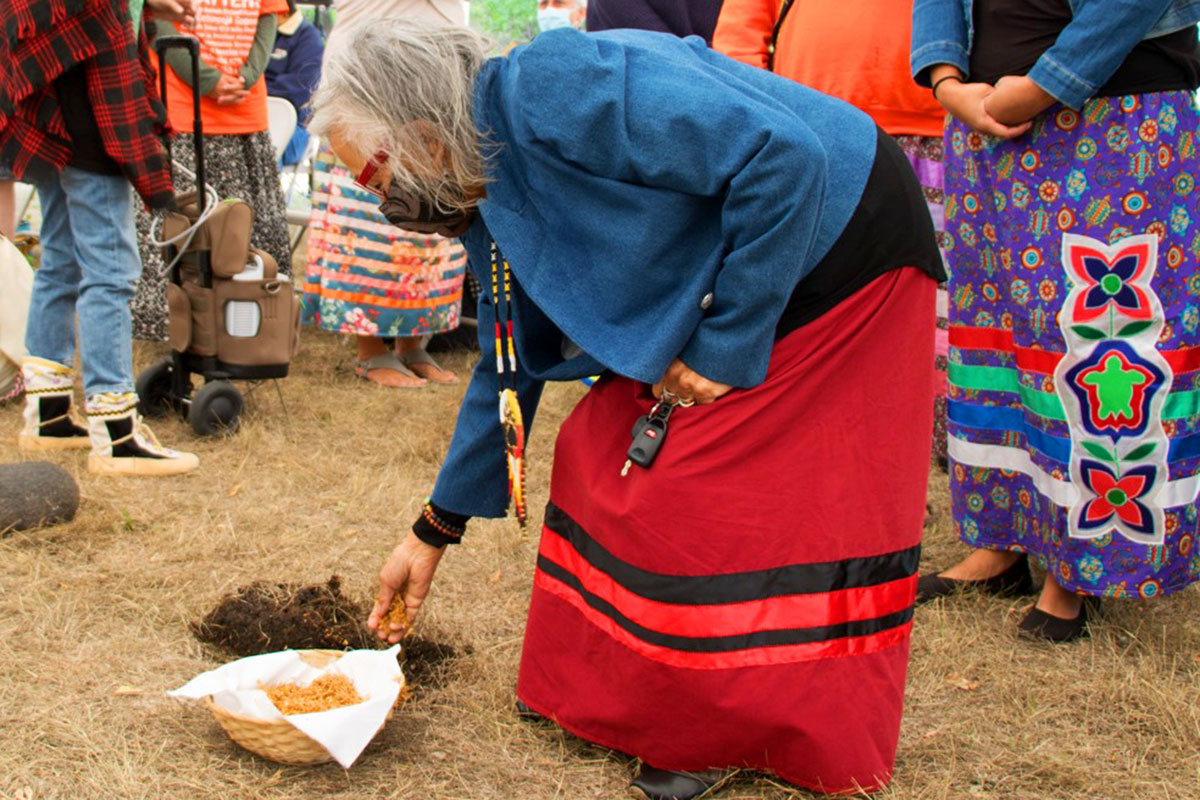
Elders and Survivors participated in the Land Blessing Ceremony on Aug. 12, 2021.
Land Blessing Ceremony held for the future home of the National Centre for Truth and Reconciliation
A Land Blessing Ceremony was held Aug. 12 at the University of Manitoba, which is the first step in envisioning the new permanent home for the National Centre for Truth and Reconciliation (NCTR).
“The NCTR is beginning a new chapter; we have moved forward quickly in the past year. The NCTR is rapidly expanding to meet the needs of communities and Survivors across the nation. However, it is important not to lose sight of the sacred responsibility the Centre has to honour the truth and sacred objects Survivors entrusted into our care. It was essential for our Elders and Survivors to guide us in ceremony as we embark on the first step in the journey of where a new building will stand one day,” said Stephanie Scott, NCTR Executive Director.
The new website and archive database was launched to get more records into the hands of Survivors, their families, and those who want to understand the history of residential schools. The NCTR has implemented new education programs and presented more public presentations than ever before. We are working hard at new partnerships and agreements to ensure the NCTR’s collection continues to grow and reveal records yet unseen.
The NCTR is currently located on the Fort Garry campus in a historic building on the Red River. Its future site will remain on the river in the newly acquired Southwood lands, which is also part of the Fort Garry campus. The new site will provide NCTR with the space it requires for the work mandated by the Truth and Reconciliation Commission and Survivors.
Finding thousands of children who died and did not return from the residential schools in unmarked burials across the country emphasizes the need for further truths, which will lead to reconciliation in this country. The new building will support the ongoing work of the Centre, provide a safe space for Survivors and their families, and allow the NCTR to continue the research to find the truth through the records and Survivor oral histories; statements which were valiantly shared by Survivors. The millions of records will further reveal how children in residential schools lost their lives and where they are buried.
“The new home for the NCTR will be Indigenous led, as this is vital in creating the necessary environment. But reconciliation is a shared role. As such, the partnership with the University of Manitoba is vital, as are the partners and funders needed to support this work. To do this we need continued commitment from the federal government for capital funding and partners to make this home a reality,” said Dr. Catherine Cook, Vice-President (Indigenous) at the University of Manitoba.
The NCTR Governing Circle, the Survivors Circle, NCTR staff, and University of Manitoba executives were guided by the Elders in Residence in ceremony to envision the NCTR’s new home. The collective visioning included how the building will be created as an Indigenous space that promotes learning, and cares for Survivors Statements, residential school records, and sacred objects for future generations.
“We are humbled to be the host of the NCTR and to put plans in place to continue to support the NCTR, and Truth and Reconciliation in our country. The new home for the NCTR will open up many opportunities for education and learning on residential schools for students, staff, and faculty as well as the rest of the country,” said Dr. Michael Benarroch, President and Vice-Chancellor at the University of Manitoba.






